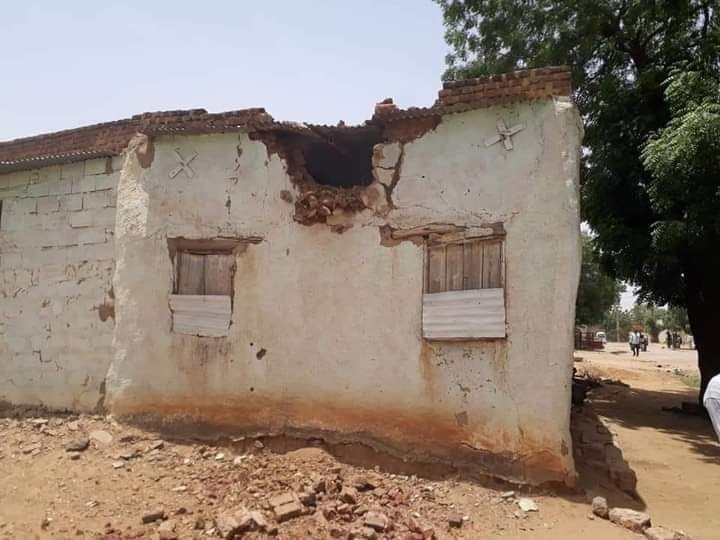Cautious calm, electricity restored in North Kordofan, clashes continue in South Kordofan

A damaged house in El Obeid on the first day of the SAF-RSF war (File photo: social media)
EL OBEID / EL RAHAD /KADUGLI –
El Obeid and El Rahad in North Kordofan experienced relative calm over the past two days, thanks to successful communication between native administration leaders and the Rapid Support Forces (RSF). In Kadugli, South Kordofan, clashes continued between SPLM-N (El Hilu) and the Sudanese Armed Forces (SAF). El Debibad in South Kordofan recently witnessed a large-scale attack, which led to the interruption of services in the town.
In North Kordofan, the state capital El Obeid and the town of El Rahad have experienced relative calm since the beginning of the week. Native administration* leaders, notables, and intellectuals successfully negotiated an agreement with the RSF, committing to safeguard residents and secure the roads connecting El Rahad with El Obeid.
Mansour Mirghani, a leader from the Badriya tribe, told Radio Dabanga that they reached an agreement with RSF leaders to ensure the uninterrupted functioning of power stations. As a result, electricity has been restored in El Obeid. Efforts are underway to initiate maintenance work on the water station and lines.
On the agreement to secure the road connecting El Obeid with El Rahad, Mirghani noted that “traffice has resumed, and measures are being taken to clear the roads of criminal gangs involved in armed robberies”. He praised the cooperation of the Military Intelligence in securing the areas under their control.
Last week, El Rahad witnessed clashes resulting in 10 deaths and seven injuries. The town faced repeated plundering of markets, shops, and both private and public facilities in recent weeks.
According to local sources, the flow of goods to the North Kordofan capital has increased, leading to lower prices for essential commodities like flour. Numerous bakeries and mills have also resumed their operations following the restoration of electricity.
However, the efforts of the Greater Kordofan Native Administration to establish communication with the RSF to ease tensions have reportedly hit a roadblock. A civil society leader who chose to remain anonymous reported that discrepancies within the native administration’s leadership have resulted in ‘the suspension of communication with the forces’.
The two parties are scheduled to convene a meeting on either Tuesday or Wednesday to establish joint mechanisms and channels of communication. Both parties have agreed to refrain from engaging in collective organised actions that could lead to direct confrontations.
The initiative emphasised avoiding tribal rhetoric that may incite tribal conflicts or tensions, as well as discouraging hate speech and the attribution of armed groups to any specific tribe.
South Kordofan
In the area south of Kadugli, capital of South Kordofan, artillery shelling persisted on Tuesday between the Sudan People’s Liberation Movement-North under the leadership of Abdelaziz El Hilu (SPLM-N El Hilu), and army forces. Rebel combatants recently took control of the area.
A recent large-scale attack on the town of El Debibad in the north-western ern part of South Kordofan resulted in a deteriorating security situation, disrupted services, and the suspension of both private and public businesses.
A resident of El Debibad told Radio Dabanga that “all supplies are now sourced from El Obeid in North Kordofan, Delling in South Kordofan, and Abu Zeid in East Jebel Marra”. The recent wave of robberies has brought traffic on the roads to a standstill.
The source predicted that the agricultural season would face significant challenges, including the disruption of health services, the suspension of business activities, banking services, and the closure of public institutions.
*The Native Administration was instituted by British colonial authorities seeking a pragmatic system of governance that allowed for effective control with limited investment and oversight by the state. The ethnically-based Native Administration also took on new responsibilities for executing policies, collecting taxes, and mobilising labour on behalf of the central government. According to the Darfur Bar Association (DBA), the Native Administration during the 30-year rule of dictator Omar Al Bashir did not represent the real community leaders.








 and then
and then